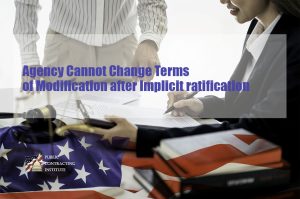As readers of this blog are aware, where a contractor initially files a protest at an agency, any subsequent protest to the Government Accountability Office (“GAO”) must be filed within 10 calendar days of “actual or constructive knowledge of initial averse agency action.” 4 CFR § 21.2(a)(3). “Adverse agency action” means “any action or inaction by an agency that is prejudicial to the position taken in a protest filed with the agency, including a decision on the merits of the protest.” 4 CFR § 21.0(e). This generally means a communication from the agency denying the protest. But what happens if the protester does not actually receive the communication from the agency because its office is closed on that day? GAO has concluded that a protester should not be charged with “constructive knowledge” if receipt of the agency’s decision where receipt of the communication occurred outside the company’s regular business hours. Tribologik Corp., B-417532, Aug. 2, 2019. It then becomes incumbent upon the protester to establish when it actually received the communication from the agency.

Tribologik protested its exclusion from the competitive range in a contract for testing of lubricating oil used on Navy ships. The Navy sought dismissal of the protest, arguing that the denial of Tribologik’s protest was sent via email on April 19, 2019, but the GAO protest was not filed until May 2, 2019, 13 days later. The Navy noted that Friday April 19, 2019 was not a federal holiday and that the denial was emailed during “normal working hours.”
The GAO examined the facts closely. Tribologik’s offices, pursuant to company policy, were closed on Friday April 29, 2019 (Good Friday), and no emails were downloaded for viewing until Monday, April 22, 2019 when the office reopened. Tribologik argued that it should not be charged with constructive knowledge of the Navy’s decision where the receipt of the email occurred outside the company’s regular business hours. The GAO agreed, stating that “mechanical receipt of an agency-level protest decision on a non-business day does not constitute constructive knowledge…[and] in determining whether the protester should be charged with constructive knowledge of the agency’s adverse decision, we look to the protester’s regular business hours, not the agency’s regular business hours.” Therefore, Tribologik did not possess actual knowledge of the protest on April 19, 2019, but obtained it on April 22, 2019, and filed its GAO protest within 10 days of when it received actual knowledge. Therefore the protest was timely, and GAO declined to dismiss it.
Takeaway. If a protester submits an agency-level protest which is denied by the agency during a company’s normal non-business hours and not received by the company, the company can still submit a timely protest at the GAO within 10 days of its actual receipt on the next business day.
For other helpful suggestions on government contracting, visit:
Richard D. Lieberman’s FAR Consulting at https://www.richarddlieberman.com/, and Mistakes in Government Contracting at https://richarddlieberman.wixsite.com/mistakes
